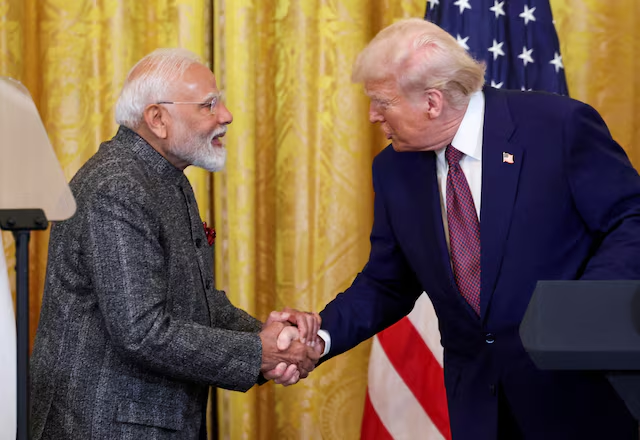NEW DELHI – Hopes for a swift trade deal between India and the United States are dimming as talks have reportedly hit a roadblock over contentious issues like import duties on auto components, steel, and agricultural goods, according to Indian officials with direct knowledge of the discussions. This impasse casts doubt on reaching an agreement before President Donald Trump’s looming July 9 deadline to impose reciprocal tariffs on Indian goods.
Despite earlier optimism, fueled by Trump’s suggestion of a “no tariffs” agreement from New Delhi, progress has been slow. India is actively pushing for a rollback of the proposed 26% reciprocal tariff set to take effect next month, in addition to seeking concessions on existing U.S. tariffs on steel and auto parts. However, U.S. negotiators are reportedly demanding deeper import tariff cuts from India on products such as soybeans, corn, cars, and alcoholic beverages, alongside an easing of non-tariff barriers, before agreeing to India’s requests.
One Indian government source, speaking anonymously due to the confidentiality of the talks, stated, “The U.S. side first wants India to commit to deeper import tariff cuts on farm goods like soybeans and corn, cars and alcoholic beverages along with easing of non-tariff barriers,” leading to the current disagreement. Another source indicated that while an Indian delegation is still expected to travel to Washington before the deadline, discussions may now shift towards a broader, more comprehensive agreement rather than a rushed interim deal.
Prime Minister Narendra Modi’s government is keen to attract U.S. firms and diversify supply chains away from China, positioning India as a key U.S. partner. India has offered concessions on items like almonds, pistachios, and walnuts, and has shown willingness to extend preferential treatment for American imports in sectors including energy, autos, and defense. Despite these gestures and multiple rounds of talks, a breakthrough remains elusive.
Officials, however, emphasize India’s long-term commitment to the U.S. as a trusted economic partner, even while maintaining policy independence. Modi and Trump had previously agreed in February to finalize the first phase of a bilateral trade agreement by autumn 2025 and aim to expand bilateral trade to $500 billion by 2030, a significant increase from the approximately $191 billion recorded in 2024. In the meantime, India is also actively pursuing other trade agreements, including advancing talks with the European Union for a free trade pact later this year and having recently concluded discussions for an FTA with the United Kingdom, moves seen as a hedge against potential U.S. policy shifts under the current administration.
Ram Singh, head of the Indian Institute of Foreign Trade, commented that “The ball is now in the US court. India is not for any win-lose trade partnership.” Even in a worst-case scenario where reciprocal tariffs are imposed, Indian officials believe the country can absorb the impact, noting its continued tariff advantage over competitors like Vietnam and China. Indeed, India’s exports to the U.S. saw a rise in April-May, suggesting a limited immediate impact from the U.S. tariff hikes that averaged 10% in early April. However, the outcome of the impending Washington talks and any direct intervention by Modi and Trump remain critical for the immediate future of U.S.-India trade relations.

